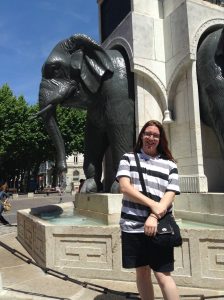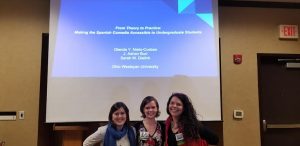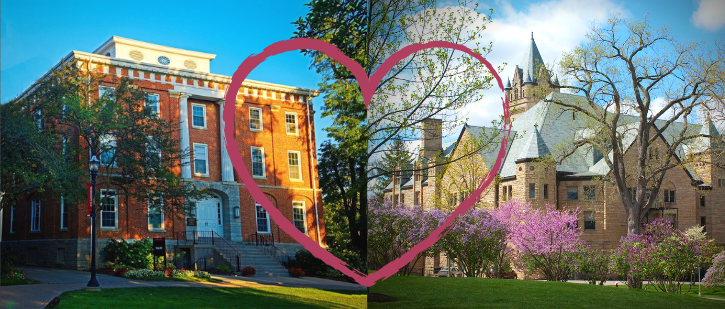#TBT: Taking a time machine two years back, today we bring you another throwback interview. In April of 2018, Sturges Script Managing Editor Anna Davies (’19) interviewed Dexter Adams (’18), Brandon Stevens (’20), and Adrian Burr (’19) on the relationship between their English and Modern Foreign Language majors and minors. They share what they find most rewarding about each discipline as well as the marriage of their literary and linguistic loves!
What’s your major/minor combination?
Dexter: I am a Creative Writing major with a Spanish minor.
Brandon: I am an English Literature and French double-major. I also have minors in Medieval Studies and Theatre.
Adrian: I am a Spanish and Creative Writing double major with an intended minor in Renaissance Studies.
How did you become a language major/minor?
Dexter: I had taken Spanish since middle school and I wanted to better my understanding and comprehension of the language. Originally, I came to OWU to pursue a major in Zoology, but I found that a life in the sciences was not for me.

Brandon and the Fountain of the Elephants in Chambéry, France
Brandon: When I was thinking about college while I was still in high school, I didn’t know what I wanted to major in. I had a lot of interests and I didn’t want to choose something and sacrifice everything else. I took French for four years in high school and wanted to continue learning and speaking it in college, so I registered for a French class for my first semester. During the semester, I realized that I couldn’t imagine not studying French, so I added it as a major. I enjoy learning French as a process of learning grammar and as a process of learning about cultures of Francophone countries.
Adrian: I always planned to be a Spanish major. I was drawn to the major when looking for colleges because I had been taking Spanish classes since 1st grade and had lived in a Spanish-speaking country for a while. I felt that I needed to take my study of the language as far as possible since I had already put so many years into learning it.
How did you become an English major?
Dexter: After finding that I didn’t want to pursue the sciences, I decided to pursue something that had always been a passion of mine–writing. I had always thought myself to be a writer, even from a young age. It has always been a way to relieve stress for me and it had never occurred to me until college that it could have been a potential career, but here I am.
Brandon: My admission letter to OWU says that I want to major in Sociology/Anthropology. But English was my favorite subject in high school and I had an English professor as my registration guide during Orientation, and so I took a few English classes my first semester. Then I fell down the rabbit hole and now I love being an English major.
Adrian: When I first came to OWU I intended to double major in Spanish and Theater, but I realized that I was more passionate about English than theater when I took Amy Butcher’s Creative Nonfiction class in my sophomore year. I discovered how fun it was to play with my own memories and experiences, and shape them into a narrative that was engaging and moving.
What are your goals for your English major?
Dexter: In the long run, I hope to be a novelist, as I have a lot of story ideas that I want to get published. With my Spanish minor, I am hoping that the knowledge and ability that I have gotten will provide me with more job opportunities as I work my way up to becoming a novelist.
Brandon: I don’t really have any specific goals as an English major. When I decided that I would major in it, I just knew that it was what I wanted to study for the next few years. I do want to build my critical thinking and my writing skills.
Adrian: I realized that, of all the skills I could learn and improve on in college, the ability to write well was the most important to me. This became clear to me when I would spend just as much time editing Amy Butcher’s essays than I did on the homework for the rest of my classes combined.

Adrian Burr and Sarah Gielink giving a presentation with Professor Nieto-Cuebas at a classical Spanish theater conference in Spring 2018
How are your English and language majors similar and different?
Dexter: The only difference between my major and minor, beside the language difference, is that the majority of my Spanish courses were heavily based on learning the actual language. Other than that, both of the departments delve into a higher understanding of the mechanics of writing in the respective languages. I have enjoyed learning a new language and I enjoy writing, so having a major and minor in both of these departments is a win-win for me.
Brandon: Both majors involve quite a lot of reading! A great deal of my French classes are focused on literature as opposed to society and culture or grammar. However, I write a lot more in my English classes.
Adrian: The majors are fairly similar in the material that I study since I read a large body of literature for each class. However, the knowledge that I take away from my Spanish readings is often a reflection of my desire to understand a foreign culture, whereas my English readings focus on understanding a foreign past, or simply understanding the finer points of the work so that I can move beyond the work to critical analysis. These various aspects of reading a text are present in my study of both of the languages, but I privilege certain aspects for the different languages. Spoken communication is also more emphasized in Spanish, since our overall goal is interaction with native Spanish speakers. English allows me more creative freedom in my writing and a more in-depth study of a text itself. But in studying Spanish, I am opening up a whole other world of literature and culture, so I am doubling the material I can look at and the people I can connect with. It might seem obvious, but the only downside about studying Spanish literature is that I can’t understand it quite as well as English literature, but the fact that I can study it at all far outweighs this frustration.
How do your majors/minors complement each other?
Dexter: I have written both academic essays and short stories for both departments, and while it is much more difficult to do such in Spanish, it is this challenge that, I feel, betters my writing ability.
Brandon: In my classes on medieval literature, I often end up reading works by authors who were from France or who wrote in Old French. For some works and authors, I have actually studied them in both French and in English classes. Overall, my English classes have helped my writing and analytical skills for writing essays and discussing literature in French classes.
Adrian: My Renaissance Studies minor came about because I took so many literature courses in each of my majors that dealt with Renaissance literature, so my minor is really just an indication of one of my areas of focus within my study of literature.
How do imagine using both majors/minors in the future?

Dexter as Don Juan in SPAN 369’s class project on The Trickster of Seville
Dexter: As I have said, with my major, I hope to become a novelist, and with my minor, I believe that it will give me opportunities as a written translator or even an article writer for a Spanish-speaking audience.
Brandon: I have thought about going to graduate school for English, and my French knowledge means that I might be able to apply for Comparative Literature programs. I’m also interested in translation and interpretation.
Adrian: I know I want to go to grad school, and as my minor indicates, I really love putting literature into its social and cultural context because I think it reveals so much about how a particular work (or the family of literature that that work arose from) was a product of individuals dealing with societal change, pressure, and growth. Literature highlights the ways groups of people are reacting to their environment. It’s a way for me to get inside their experience. I’m exciting to study more contemporary literature in the future and apply the skills I’ve learned to unwrapping how people are reacting to more recent change.
Do you favor one major/minor over the other?
Dexter: I would say that I favor my Creative Writing major more than my Spanish one as it is the field that I have the most experience in.
Brandon: No! I could never decide between them; I love them both equally for different reasons.
Adrian: In a classroom setting, I enjoy my English major more because I can do a more in-depth study of whatever I’m reading. But my Spanish major opens up so many opportunities for me to connect with people outside the classroom, and it’s empowering to be able to travel in so many countries and be able to speak the language. I enjoy them both, but in different settings.
Has there ever been a time when your majors connected or you realized they were were more connected than you thought?
Dexter: In, I believe, SPAN 250, we had an assignment to write a short story in Spanish. As I had been writing for almost my entire life up until that point, I feel that the task was a lot easier for me, despite having to write in another language.
Brandon: In Fall 2017, I took two classes on medieval literature, one French and one English. I ended up reading the Lais of Marie de France for both classes a few weeks apart. Never before had my two fields of study interacted in this way. In general, the reading and writing skills that I have developed as an English major have certainly aided me while reading and writing in French.
Adrian: I’ve always known they were connected, but I realized just how connected they were when I took a 20th century Spanish literature course. This was one of my first experiences with an advanced, specialized course in Spanish literature, and it was the first course where I really felt that the only difference between my Spanish and English majors was that I was reading in a different language, the concepts and methods of approach were the same. I might still have felt a bit handicapped, but the overall goal was the same. It was a literature class. I’ve found that once you reach a certain level of Spanish you forget that what you are studying is not in your birth language. The play becomes just a play, a poem a poem, an essay an essay, etc.
What’s your favorite part about each major/minor or about being a double major/minor?
Dexter: My favorite part of being a Creative Writing major and a Spanish minor is the amount of creativity that I am allowed to show. With my major, it is of course obvious that I can write creatively, but with my minor in Spanish, I am given another way to express myself.
Brandon: I love English for the variety of classes that I get to take–from Shakespeare to the 19th century to the postcolonial world. I love French for the world it opens to me, and the amazing literature that is there. I love being a double-major because of the synergy between them and the skills that I learn from both of them. Studying a foreign language has added to my knowledge of English and my knowledge of English helps me understand and speak French better.
Adrian: My favorite part about my English major is that it opens up ways of viewing the world, because each text is a window into a new experience. I feel the same way about Spanish, but the things I encounter are doubling revealing because they also allow me access to a whole new group of people that I can connect with. This is my favorite part of being a double language major–I am doubling the amount of literature I can read and the amount of people I can connect with and write about.

